Early food memories go back to the chocolate pudding my parents bought weekly. Sometimes I wonder how many of those puddings I must have eaten. Enough to keep the factory that produced them open…maybe? Nowadays pudding isn’t on the menu anymore. I got saturated, eventually.
The next food memory that comes to mind is my preference for a specific brand of cheese named ‘Père Joseph’. This cheese has a relatively soft or medium texture and a creamy taste. I must have been 10 or 12 years old when eating it for the first time. One day my father asked what cheese I wanted to eat for lunch, to which I replied ‘Père Joseph’, quite stubbornly. He replied I was quite demanding. At the time it was virtually the only cheese I ate. None of that Brie, Bleu d’Auvergne or Gouda ‘nonsense’ for twelve year old me.
So, from an early age on I was very specific or overly enthusiastic about a certain type of food. That attitude hasn’t changed: sometimes I will make a detour just to get a specific product such as jumbo olives, or fresh simits (a type of Turkish bread) at the town market in Rotterdam.
HISTORY
In 2009 I wrote a bachelor thesis about 16th and 17th century cook books in the area that is Belgium today. I researched links between food and health advice.
One of my professors suggested this subject for my paper. I was quickly convinced that this was the right topic to write about. It turned out to be fun to research. I later realized this made so much sense, given my (so far) lifelong interest in specific foodstuffs and the Aypau blog I started in 2015. This is why I want to share some insights about food and history with you!
Here are some types of remarkable advice that circulated in the early modern period (16th and 17th century), in a nutshell:
- People who ranked lower on the social ladder had to consume food that was found/grew closer to the ground, thus food that was deemed less noble.
Not eating according to your social position was thought to put your health at risk (H.Pleij, dromen van cocagne). - ‘Een notabel boecxken van cokeryen’, published by Thomas Van Der Noot, contains recipes for preparing peacock and swan (kookhistorie.nl)
- Several cook books were written or compiled by doctors. Why? E. Cockx- Indestege mentions the risk of monotone, heavy-on the stomach or rotten food was real. Hence the doctor’s advice.
- Herbs and spices were considered to be medicinal food rather than flavour enhancing products
- Some doctors believed that the nutritional value of fruit&veg was low (H.Sels, de verstandige kok). Before you think ‘O, that’s why folks in renaissance paintings look so pale’, consider this: fruit consumption was not forbidden. However, some authors thought it was safer to cook, dry or use spices to improve the fruit (K. Albala, food in early modern Europe)

I look forward to to reading more about food history. I’m always especially interested in the sort of moral and political connotations people put on the food they eat or ate.
LikeLiked by 1 person
Hi Donald, that’s nice to hear. I plan on writing an article about contemporary conceptions and will probably include some references to the past.
LikeLike